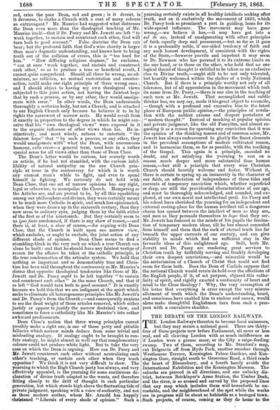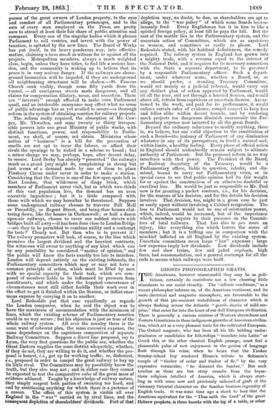THE DEBATE ON THE LONDON RAILWAYS. T HE London Railways threaten
to become local nuisances,. but they may secure a national good. There are thirty- four of these projects now before Parliament, all more or less. real, and all cleaving London with as much indifference as- if London were a grouse moor, or the City a snipe-feeding: swamp. Two of them, according to Mr. Stanford's map,. cut Belgravia off from Hyde Park, another smashes through Westbourne Terrace, Kensington Palace Gardens, and Ken- sington Gore, straight south to Grosvenor Road, a third rends the heart of Bloomsbury, and a fourth barely avoids the International Exhibition and the Kensington Museum. The suburbs are pierced in all directions, and, one unlucky dis- trict, between Bricklayer's Arms Station, the Timber Dock, and the river, is so crossed and carved by the proposed lines that any map which includes them will henceforth be un- readable, and the neighbourhood of the spot while the works are in progress will be about as habitable /I s a besieged town. Such projects, of course, coming as they do /Wee to the purses of the great owners of London property, to the eyes and comfort of all Parliamentary personages, and to the ears of every man employed on the Times, are pretty sure to attract at least their fair share of public attention and comment." Every one of the singular bodies which it pleases Parliament to call vestries, and invest with the power of taxation, is agitated by the new lines. The Board of Works has put itself, in its heavy ponderous way, into effective motion, claiming a locus standi as witness for or against all the projects. Metropolitan members, always a much weighted class, begin, unless they have titles, to feel life a serious bur- den, and the community is waking up to believe that its peace is in very serious danger. If the railways are above- ground locomotion will be impeded, if they are underground all neighbouring structures will be shaken.—St. Pancras Church sunk visibly, though some fifty yards from the tunnel, — all contiguous streets made dangerous, and all claims for compensation dilatory, mean, and uncertain. There are " interests " enough affected to make even Parliament quail, and an intolerable annoyance may effect what no sense of public advantage has as yet availed to secure—a thorough reform in the system of obtaining sanction for railway projects.
The reform really required, the absorption of Mr. Cow- per, Mr. Thwaites, and some twenty or thirty irrespon- sible powers into one great Ministry of public works, with distinct functions, power, and responsibility to Parlia- ment, we shall, of course, not obtain. Ministries whose notion of "business" is a bill for the prevention of smells are not apt to incur the labour, or afford their rivals the openings to be risked in a scheme so broad ; but a minor change we may, perhaps, hope, after decent delay, to secure. Lord Derby has already "presented " the railways much as a grand jury might do, complaining in strong but just terms of a demand made by one of them to place Finsbury Circus under cover in order to make a station. Considering that the Circus is one of the few open spots left in East London, that wilderness of dingy brick, which members of Parliament never visit, but in which two-thirds of this vast population live, the demand has an even eccentric impudence ; but it is little compared with those with which we may hereafter be threatened. Suppose some underground railway chooses to traverse Pall Mall or Piccadilly, or Regent Street, and bring those houses clat- tering down, like the houses in Clerkenwell; or half a dozen open-air railways, choose to cover our noblest streets with bridges built all awry—it has been done close to London Bridge —are they to be permitted to combine utility and a contempt for taste ? Clearly not. But then who is to prevent it ? The railway promoters will look, of course, to the line which promises the largest dividend and the heaviest contracts, the witnesses will swear to anything of any kind which can by any possibility be considered " matter of opinion," and
the public will know the facts exactly too late to interfere. London will depend entirely on the existing tribunals, the Parliamentary committees which may or may not have a common principle of action, which must be filled by men with no special capacity for their task, which are com- posed of members liable to be influenced by pressure from constituents, and which under the happiest concurrence of circumstances must still either huddle their work over in the effort to get it finished within the Session, or inflict enor- mous expense by carrying it on to another.
Lord Redesdale put that case excellently as regards the London companies, when he said the object was to have the maximum of accommodation with the minimum of tines, which the existing scheme of Parliamentary sanction could in no way secure ; but his objection is just as true of the whole railway system. All over the country there is the same want of coherent plan, the same excessive expense, the same dependence on the capricious composition of separate Railway Committees. Suppose a direct line proposed, say to Lynn, the very first questions for the public are, whether the Great Eastern supplies the same district adequately, whether, if they do not, they are willing to do it, and whether the pro-
posal is honest, i.e., got up for working traffic; or, dishonest, e., proposed in order to compel the great railway to buy up its little rival. The Committees may by possibility know the
truth, but they also may not ; and in either case they cannot
be expected to test the comparative value of the great mass of evidence adduced. Taught by a knowledge of railway nature,
they simply suspect both parties of swearing too hard, and
end by sanctioning anything for which there is a pretence of a reason. The, effect of this system is visible all over England in the " war" carried on by rival lines, and the consequent depletion of shareholders' dividends. Part of that depletion may, no doubt, be due, as shareholders are apt to allege, to the "war policy" of which some Boards become insanely fond. Every Englishman has it in hint to like a spirited foreign policy, at least till lie pays the bill. But the root of the matter lies in the Parliamentary system, and the uncertain action of Committees, which are as capricious as women, and sometimes as costly to please. Lord Redesdale stated, with his habitual definiteness, the remedy required. The railway system in England has grown into a mighty trade, with a revenue equal to the interest of the National Debt, and it requires for its necessary connection with the State a separate department, to be governed. by a responsible Parliamentary officer. Such a depart- ment, under whatever name, whether a Board, or, as we should prefer, a standing Treasury Committee, would act mainly as a judicial tribunal, would carry out any distinct plan of action approved by Parliament, would sit all the year, and not through a hurried Session, and would above all, refrain from capricious or uncertain decrees. Accus- tomed to the work, and paid for its performance, it would enforce certain rules of evidence, compel counsel to keep fees and folios alike within decent bounds, and by rendering mock projects too dangerous diminish enormously the Par- liamentary expense now incurred by all the great Boards.
Beyond the ordinary reluctance to modify anything, there is, we believe, but one valid objection to the constitution of such a Board—the jealousy of Parliament of any diminution whatever in any of its prerogatives, in itself a natural and, within limits, a healthy feeling. Every phase of official action in England should undoubtedly remain subject to ultimate authority of Parliament. But the proposed reform in no way interferes with that power, The President of the Board, or Railway Secretary of the Treasury, would be a Parliamentary officer, liable to question, rebuke, and dis- missal, bound to carry out Parliamentary votes, or in special cases to see that public opinion had its fair weight for or against the construction of an otherwise doubtful or excellent line. He would be just as responsible as Mr. Peel now is for granting a packet contract, i.e., for his decision, for the reasons of his decision, and for the details his decision involves. That decision, too, might in a gross case be just as easily upset without involving a Cabinet resignation. The loss to Parliament would not be one of substantive power, which, indeed, would be increased, but of the importance which members acquire by their presence on the Commit- tees of local railways. That loss also is pro tanto an injury, like everything else which lowers the status of members ; but it is a trifling one in comparison with the mischief inflicted on all England by the existing system. Uncertain committees mean large " law" expenses ; large law expenses imply low dividends. Low dividends include few and slow trains, few and jaded employes, high fares, bad accommodation, and a general contempt for all the ends to secure which railways were built.































 Previous page
Previous page